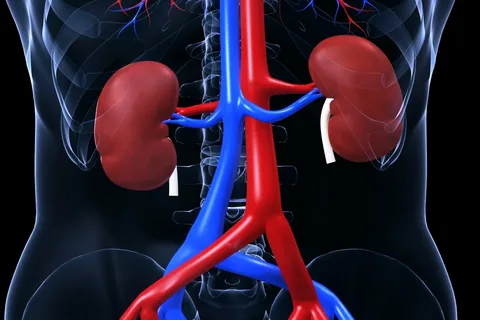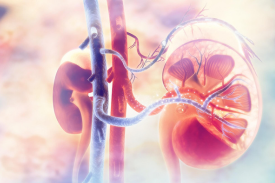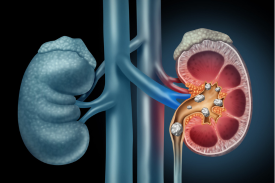Understanding Chronic Kidney Disease: Causes, Symptoms and Stages
Chronic kidney disease (CKD) is a condition in which the kidneys gradually lose function over time. The kidneys play a crucial role in filtering waste products and excess fluid from the blood, and regulating electrolyte balance, blood pressure, and the production of red blood cells. CKD can lead to various complications, including anemia, bone disease, nerve damage, and cardiovascular disease.
Causes of Chronic Kidney Disease:
Chronic kidney disease (CKD) can be caused by a variety of factors that damage the kidneys and impair their ability to function properly. Some of the most common causes of CKD include:
- Diabetes: High blood sugar levels can damage the small blood vessels in the kidneys, leading to kidney damage over time.
- High blood pressure: Uncontrolled high blood pressure can damage the blood vessels in the kidneys, leading to kidney damage over time.
- Glomerulonephritis: This is a type of kidney inflammation that can damage the glomeruli, the small filtering units in the kidneys.
- Polycystic kidney disease: This is an inherited condition in which cysts grow in the kidneys, leading to reduced kidney function over time.
- Prolonged use of certain medications: Certain medications, such as nonsteroidal anti-inflammatory drugs (NSAIDs) and some antibiotics, can cause kidney damage with prolonged use.
- Urinary tract obstruction: An obstruction, such as a kidney stone or an enlarged prostate, can block urine flow and cause kidney damage.
- Autoimmune diseases: Some autoimmune diseases, such as lupus and IgA nephropathy, can cause kidney inflammation and damage.
- Infections: Some infections, such as pyelonephritis (a type of kidney infection), can cause kidney damage.
- Congenital kidney defects: Some individuals may be born with abnormalities in their kidneys that can lead to CKD later in life.
These are just a few of the many possible causes of CKD. It is important to identify and manage the underlying cause of CKD in order to slow down the progression of the disease and prevent complications.
Symptoms of Chronic Kidney Disease:
In the early stages, chronic kidney disease (CKD) may not cause any noticeable symptoms. As the disease progresses and kidney function declines, however, individuals may experience a variety of symptoms, including:
- Fatigue and weakness: As the kidneys are no longer able to filter waste products and excess fluid from the blood effectively, this can cause a buildup of toxins in the body, leading to fatigue and weakness.
- Decreased urine output or changes in urination: Individuals with CKD may notice changes in their urine output, such as producing less urine than usual or having foamy or dark urine. They may also experience difficulty urinating or feel a frequent need to urinate, particularly at night.
- Swelling: Fluid buildup in the body can cause swelling in the feet, ankles, legs, or around the eyes.
- Shortness of breath: Anemia, a common complication of CKD, can cause shortness of breath or difficulty breathing.
- Nausea and vomiting: The buildup of toxins in the body can cause nausea, vomiting, and a loss of appetite.
- Itching: The accumulation of waste products in the blood can cause severe itching, especially on the legs and back.
- Muscle cramps: The imbalance of electrolytes in the body can cause muscle cramps, particularly in the legs.
- High blood pressure: CKD can cause high blood pressure, and in turn, high blood pressure can cause further damage to the kidneys.
- Bone pain or fractures: CKD can cause bone disease, which can lead to bone pain or an increased risk of fractures.
It is important to note that these symptoms can be caused by other conditions as well, so it is important to see a healthcare provider for a proper diagnosis. Early detection and treatment of CKD can help slow down the progression of the disease and prevent complications.
Stages of Chronic Kidney Disease:
Chronic kidney disease (CKD) is typically classified into five stages based on the estimated glomerular filtration rate (eGFR), which measures how well the kidneys are functioning. The stages are as follows:
- Stage 1: eGFR of 90 or higher – Kidney damage is present, but the kidneys are still functioning normally.
- Stage 2: eGFR between 60 and 89 – Kidney damage is present, and there is mild loss of kidney function.
- Stage 3: eGFR between 30 and 59 – There is moderate loss of kidney function.
- Stage 4: eGFR between 15 and 29 – There is severe loss of kidney function.
- Stage 5: eGFR less than 15 – Kidney failure, also known as end-stage renal disease (ESRD), is present.
In addition to the eGFR, the stages of CKD can also be determined by the presence of kidney damage, as indicated by protein or albumin in the urine or abnormalities seen on imaging tests.
It is important to note that the symptoms and complications of chronic kidney disease can vary widely depending on the stage of the disease. In the early stages, there may be few or no symptoms, and the disease may be diagnosed through routine blood and urine tests. However, as the disease progresses, complications can become more severe and include anemia, bone disease, high blood pressure, nerve damage, and cardiovascular disease.
Role of a Neurologist in Managing Chronic Kidney Disease:
While a neurologist may not be the primary healthcare provider for patients with chronic kidney disease, they can play an important role in managing the condition, particularly in cases where the disease is causing neurological symptoms or complications.
For example, patients with advanced chronic kidney disease may experience uremic encephalopathy, a condition in which toxins build up in the brain, leading to confusion, seizures, and other neurological symptoms. A neurologist can help manage this condition through medications and other interventions. In addition, patients with chronic kidney disease may be at higher risk for stroke and other cardiovascular events, and a neurologist can help manage these risks through the use of medications and lifestyle interventions.
Conclusion:
Chronic kidney disease is a serious condition that can lead to a range of complications and health problems. It is important to seek medical attention if you are experiencing symptoms of the disease or have risk factors such as diabetes or high blood pressure. While there is no cure for chronic kidney disease, early diagnosis and management can help slow the progression of the disease and reduce the risk of complications. A neurologist can play an important role in managing the neurological symptoms and complications of chronic kidney disease, and may work alongside other healthcare providers to develop a comprehensive treatment plan for patients.
At https://www.puneurologist.in/, the team of experienced neurologists can provide comprehensive care and support for patients with chronic kidney disease. We understand the complex interactions between neurological symptoms and kidney function, and can work with other healthcare providers to develop a personalized treatment plan that addresses each patient’s unique needs and concerns.




